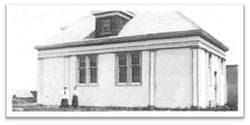On or about August of 1923, Stan Hill, the Manager of the Lyleton Branch of the Home Bank of Canada received a short telegram, delivered in code. It read; "Cease business, close the door." There was no explanation, but perhaps none was needed. The security of the banking system that Canadians prize today was not always a given. In the period between 1867 and 1923, 25% of banks failed. And regarding this particular bank, there must have been some rumours.

The Home Bank was incorporated July 10, 1903 in Toronto and was soon beset by scandals involving questionable loans and suspect business practices. In 1914, William Machaffe, a manager in the Winnipeg Branch, warned the western directors about what he called “cooking the books”. He was fired and subsequently became what we today call a “whistleblower”.
His allegations fell on deaf ears as a postwar inflationary boom created the illusion that all was well, until a downturn in the lending market left the bank overextended and unable to meet obligations.
The Home Bank failed on August 18, 1923, and the Federal Government agreed to pay $5450000 to depositors who had lost money, basically admitting to some culpability in the matter. This was unprecedented but the amount offered didn’t cover all the losses incurred across the land.
Looking back, we may find it interesting that the federal government of the day refused to bail out the bank, and instead allowed it to fail and compensated the depositors. And we must note that ten officials of the bank were arrested and charged. All were convicted, although most verdicts were overturned on appeal.
This scandal is credited with being the spark that ignited a general distrust of banks that persists to this day. It was also an incentive for the types of regulation, including protection for depositors that Canadian bank customers continue to expect today.
For the citizens of Lyleton, it meant getting a return of about sixty cents on the dollar for their deposits. And it meant losing the bank, which Mr. C. E. Graham opened in December 8, 1908.
The children of Chris Chalmers recall a slightly different outcome: "A severe blow came in 1922. Dad had ordered a new threshing outfit. By coincidence it was delivered at the same time that the Home Bank closed its doors. Dad dealt with the Bank in Lyleton and lost his shares as well as his money on deposit."

It had operated with a staff of three - a manager, a teller and a ledger-keeper. Office equipment included one typewriter, but no adding machine. The teller was supplied with a loaded revolver in case of a hold-up. In 1920 a fireproof vault was added which held the safe and important papers. It was a time when the popular press was full of stories about rumrunners and bank robbers. Border towns were deemed to be vulnerable. The village at that time was served by both the R.C.M.P and the Manitoba Provincial Police, who sometimes devoted manpower to guarding the bank. Constable Mike Syrson, one of those guards, laughed about, “….sitting up nights guarding and there wasn’t a penny in the place.”
We can laugh, but the Great Bank Robbery of Melita, complete with explosives, armed bandits, and a hostage, took place shortly after the Lyleton Bank closed. Bank robberies could happen.
Of course the failure of the Home Bank nationally didn’t mean that the community of Lyleton wasn’t a viable market. The Union Bank soon opened to fill the void. When it was swallowed up by the Royal Bank in 1925, the Lyleton operation was closed in favour of Melita. A former Royal Bank employee soon opened the Imperial Savings and Loan Company, but that effort was short-lived. So ended the era of bank services in Lyleton. One now had to drive to nearby Pierson. It was a pattern that would continue with other services.
. . . . .
Author: Ken Storie
Sources: Edward History Book Committee. Harvests of Time. Altona. Friesen Printers, 2003
Doan, Holly. The Big Bank Job. CPAC C2007 Photo: Edward History Book Committee. Harvests of Time. Altona. Friesen Printers, 2003. pp 245
